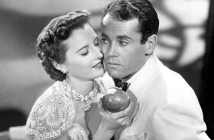
Double Indemnity (1944)
Cast: Fred MacMurray, Barbara Stanwyck, Edward G. Robinson
Directors: Billy Wilder
Country: USA
Genre: Crime | Drama | Film-Noir | Thriller
Websites: TIFF
Editor’s Notes: The following review is part of our coverage for TIFF’s Ball of Fire: The Films of Barbara Stanwyck. For more information on upcoming TIFF film series visit http://tiff.net and follow TIFF on Twitter at @TIFF_NET.
Words like ‘masterpiece’ and ‘brilliant’ are often thrown around nowadays, being applied to things that are not either but due to a generational misunderstanding of intensifiers, we now ‘epic’ to describe everything from something appropriately grandiose to a sandwich. So when I say that the film noir classic Double Indemnity is Billy Wilder’s first directorial masterpiece (after two great lead-ins with The Major and the Minor and Five Graves to Cairo), it may not hold the weight that it should, but it won’t prevent me from saying it. Double Indemnity originated the hard, cynical edge that Wilder became famous for over his career by making its two main characters pretty loathsome.
Double Indemnity originated the hard, cynical edge that Wilder became famous for over his career by making its two main characters pretty loathsome.
The story is that of Walter Neff (Fred MacMurry, later and now maybe best known for his roles in My Three Sons on television and The Nutty Professor films), a top insurance salesman who falls hard for the tough blond Phyllis Dietrichson (Barbara Stanwyck) during a routine renewal house call. She suggests an accident policy for her husband, but insinuates she doesn’t want him to know about it, which offends Walter and he quickly goes over the cases he knows of that had a wife trying to kill her husband to get insurance money and leaves in a huff.

The trouble is that she got into his head and he starts planning ways to make it work. He figures if he helps her, he can have her all to himself. Being in the business and close friends with the head claims investigator Barton Keyes (the incomparable Edward G. Robinson), he figures he can not only make it work but get double the value of the policy by staging the death that conforms to the double indemnity clause of the policy (a clause that pays double the face value of the policy if the insured meets with a highly unlikely accident). The two start canoodling and conspiring, and they’ll be in it together “Straight down the line” says Walter.
He writes the policy and enacts their plan and after the husband is disposed of, that’s when the trouble really starts for them. Investigation into the claim, evidence of a double cross and all sorts of things start to pop up that makes the entire situation untenable.
The writing, done by director Wilder with renowned hard-boiled detective novelist Raymond Chandler, is a thing of beauty.
The writing, done by director Wilder with renowned hard-boiled detective novelist Raymond Chandler, is a thing of beauty. Nearly every line of dialogue is tough when it’s not dripping with innuendo (and sometimes even then). It’s really a miracle this picture got past the Hayes Office in its finished form because stuff like this just didn’t get made. I’m sure there were changes and alterations made, but when this is the final product, I wonder what the original sounded like! Filled with Chandler’s patented one-liners and general air of toughness, the screenplay must have read like a dream. It’s also far less convoluted than most of Chandler’s work. There is a famous story about the filming of one of his novels, The Big Sleep. Director Howard Hawks couldn’t figure out who’d killed the chauffeur, so he asked the writer who also didn’t know. So, Hawks called up Chandler figuring who else would know but the author? Chandler thinks for a long while and replies “I’m really not sure who killed the chauffeur”. I don’t know if this is true or if it has been given the The Man Who Shot Liberty Valance treatment (“When the fact becomes legend, print the legend.”) but it stands as a testament to how dense and twisting Chandler’s work could get. I suspect that with Wilder writing with him, things became more streamlined because that is one of Wilder’s greatest strengths as a writer. Also helping was the source novel by James M. Cain, who was much clearer in his plotting than Chandler was (though not quite as good a writer). Wilder and Chandler fill the film with the sexual tension and a preview of the existential dread that pervaded noir after the war. This was a time before the end of the war, before the nuclear bomb was used in warfare instead of just as a deterrent. While the war is never mentioned (it seldom is in noir), it’s omnipresent in the dark tone.
With a script like that, casting would be easy, right? Wrong. Wilder tried a great many people, but no one wanted to play characters this seedy. Finally, MacMurry said yes in an effort to scuff his nice-guy image and Stanwyck, already notorious for parts like this, signed on too. Getting Robinson was a tough sell, since he’d been the lead since the 30’s, after Little Caesar but after reading the script, he agreed to the supporting role and thank the fates he did. He’s a wonder as the claims investigator who has a gut feeling he calls his ‘little man’ who tells him when something isn’t right. MacMurry also does a stellar job as the straight-laced insurance salesman who goes wrong in a big way. It’s hands down his finest performance and it’s all in his ability to sell a tough persona over his traditional nice-guy comedic roles that he immediately makes you think of when you see him on screen. Here, he’s hardened all the way around, smooth and suave.
Then there’s Barbara Stanwyck. Though I’ve always thought she looked much better as a brunette, it hardly matters here. She has always excelled in playing manipulative characters, sometimes comically and other times, like here, as devious. She plays Neff for everything he’s worth and then some in getting him to kill her husband for the insurance money, stringing him along like she’s pining for him when all the while…well, I don’t want to spoil it for anyone who hasn’t seen it. Stanwyck is at the top of her always formidable game here, making Phyllis Dietrichson vulnerable and dangerous, helpless and completely in control at the same time. She lets Neff think he’s figured out the whole scheme when she had the entire thing figured from the moment he walked in her door. She didn’t quite make it all the way to the end, but she made a good try.
Double Indemnity is undeniably one of the greatest films ever made, with a story that sucks you in right away, deep, rich shadows draping the characters to evoke the darkness into which they descend, brilliant direction from Wilder and a stellar screenplay. There are no false notes in this picture and it plays like a magnificent song, straight down the line.
Double Indemnity is undeniably one of the greatest films ever made, with a story that sucks you in right away, deep, rich shadows draping the characters to evoke the darkness into which they descend, brilliant direction from Wilder and a stellar screenplay. There are no false notes in this picture and it plays like a magnificent song, straight down the line.



